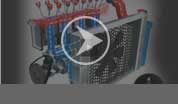Category Archives: Fuel System
Give Your Engine Clean Fuel With A New Fuel Filter From Des Moine BDG
Your minivan requires plenty of clean fuel to run. If your fuel contains contaminants, your fuel injectors will eventually become clogged up. When this happens, your minivan engine may not get the proper amount of fuel at the correct pressure to run at peak performance. This hurts gas mileage and performance as you drive around Altoona. It can also lead to the buildup of harmful deposits on valves and in the combustion chamber.
That’s why all vehicles, including minivans, come equipped with a fuel filter somewhere between the engine and the fuel tank.  The job of the filter is to clean out little pieces of dirt and contamination. The filter captures the contaminants and keeps them out of the fuel stream. Of course, like all filters, it will eventually get clogged up and need to be replaced at Des Moine BDG in Des Moines .
The job of the filter is to clean out little pieces of dirt and contamination. The filter captures the contaminants and keeps them out of the fuel stream. Of course, like all filters, it will eventually get clogged up and need to be replaced at Des Moine BDG in Des Moines .
If your fuel filter is clogged, the minivan engine can’t get all the fuel it needs, and it may sputter at high speeds or quick acceleration. Many fuel filters have a bypass valve that will allow unfiltered fuel through when they are clogged. This keeps your minivan engine running, but doesn’t protect it from detrimental contaminated fuel.
Des Moines car owners may find that they need to change their fuel filter at Des Moine BDG more frequently as their minivan ages. Over the years, additional sediment and detrimental rust accumulates in the fuel tank and can be drawn into the fuel system. Your fuel filter stands guard at the gates to your engine to protect expensive parts and to maintain performance and MPG.
Fuel System Cleaning at Des Moine BDG for Better Performance
Hi Des Moines car owners. Let’s talk fuel injectors. A fuel injector is a valve that delivers fuel to a vehicle’s engine. It has to deliver the precise amount of fuel, to precisely the right place, precisely when the engine needs it. The fuel also has to be mixed with air before it can burn in the engine.
Fuel injectors are engineered to spray fuel in a specific pattern into the engine. (The pattern varies by engine type and design.) In order to achieve these spray patterns, the fuel must be pressurized.
The pressure in a fuel injection system varies depending on its type. Many gasoline minivan engines use port injection systems, which operate with a pressure of 60 pounds per square inch. Newer direct injection systems operate at 10 to 30 times that pressure. Some diesel passenger vehicles have fuel injectors that operate at 30,000 pounds or more per square inch.
 Vehicles have one fuel injector for each cylinder in the engine. Your vehicle’s control computer constantly monitors the engine and various sensors in the vehicle and adjusts the fuel injectors accordingly so that they can deliver the proper amount of fuel to the engine. As you can see, fuel injectors are a sophisticated and vital part of your vehicle’s engine. Because fuel injectors are such precision instruments, dirt and contaminants are a serious detriment to their performance. When an injector gets gummed up, it affects the pressure, pattern and timing of the fuel delivery. The result is a decrease in fuel efficiency and loss of engine performance for Des Moines drivers.
Vehicles have one fuel injector for each cylinder in the engine. Your vehicle’s control computer constantly monitors the engine and various sensors in the vehicle and adjusts the fuel injectors accordingly so that they can deliver the proper amount of fuel to the engine. As you can see, fuel injectors are a sophisticated and vital part of your vehicle’s engine. Because fuel injectors are such precision instruments, dirt and contaminants are a serious detriment to their performance. When an injector gets gummed up, it affects the pressure, pattern and timing of the fuel delivery. The result is a decrease in fuel efficiency and loss of engine performance for Des Moines drivers.
So it’s to Des Moines auto owners’ advantage to keep their fuel injectors clean. That starts with keeping the fuel in your tank clean. High-quality fuel contains detergents and additives that help clean your engine. Brand-name fuel companies also deliver a more consistent quality of fuel to Des Moines car owners than do bargain Altoona area service stations.
The second way to keep your injectors clean is to keep your fuel filter clean. This filter screens dirt and rust out of the fuel as it travels from the tank to the engine. If the filter clogs up, fuel will bypass it and carry its load of dirt into the engine.
Des Moines motorists should check their owner’s manual to find out how often they should change their fuel filter. This should be part of your regular preventive maintenance. Also, remember that if you use bargain-brand or low-grade fuels, or if you drive an older vehicle between Des Moines, Ankeny and Berwick , your filter will need to be changed more often.
You can also purchase cleaners at Des Moine BDG that will protect your fuel injectors. These cleaners are added to the fuel tank. They work best at preventing build-up in your fuel injectors and can clean up small amounts of carbon, gum and varnish. But they won’t be able to clean a fully gummed-up injector. Read the labels before using any of these products for full directions on their use. If your fuel injectors are gummed up, you can get a professional deep cleaning service at Des Moine BDG in Des Moines that will result in better fuel efficiency and improved vehicle performance.
Good car care will prevent serious damage to your fuel injector system. And this is one system that you want to keep in perfect condition.
Fuel Saving Tip: Fuel System Cleaning Near Berwick IA
A lot of gas is wasted in the Berwick area by dirty fuel delivery systems.
Let’s start at the tank. The gas tank gathers dirt, rust and sediment over the years. That’s why there’s a fuel filter to clean the fuel after it leaves the tank. A dirty filter will rob the engine of the clean gas it needs to run efficiently.
 The fuel intake components get coated with gum and varnish over time. This results in fuel being delivered inefficiently and some of that gunk getting into the engine. A fuel system service at Des Moine BDG will leave your intake as clean as a whistle.
The fuel intake components get coated with gum and varnish over time. This results in fuel being delivered inefficiently and some of that gunk getting into the engine. A fuel system service at Des Moine BDG will leave your intake as clean as a whistle.
The big fuel thief is dirty fuel injectors. They deliver fuel to the engine at a specified pressure and in a particular spray pattern. When they’re clogged, the fuel doesn’t get atomized the way it’s supposed to and doesn’t get burned as efficiently.
See your owner’s manual or ask your Berwick service advisor at Des Moine BDG when a fuel system cleaning is recommended.
Service to Improve Fuel Economy
The price of gas in IA has got Des Moines car owners talking. It seems that Des Moines folks who need a bigger vehicle to carry family and gear, or provide four wheel drive, are hit especially. That is why we thought it would be good to review some things that anyone can do to improve fuel economy.
First let’s start with how we drive in the Altoona area. Des Moines auto owners may not realize that they can really save money on gas by just changing a few driving habits. One of the biggest is jackrabbit starts – you know, flooring the gas as soon as the light turns green. That really wastes a lot of fuel. Building up your speed at a slower pace uses less fuel and is easier on your engine and drive train. And don’t drive with one foot on the brake. That’s also a drag on fuel economy, and it wears out your brakes faster too.
Another thing Des Moines car owners can do is drive slower – but only when it’s safe. Sometimes on the freeway we drive an extra five … ten . . . twenty … over the speed limit. We do it to save time, but it only saves a few minutes out of maybe an hour long drive, and we may use 10 to 15 % more gas. Just leave Des Moines a little bit earlier, save some income and arrive more relaxed.
Des Moines auto owners can also try and combine all of their errands for the day into just one trip, rather than several. If you can put off a trip today that can be combined with one tomorrow – you can save some time and cash.
Using your cruise control can save income too. Driving in Altoona at a constant speed really improves fuel efficiency. Be sure to only use your cruise control in IA under safe conditions – you can look in your owner’s manual for some essential good tips on using your cruise control.
Did you know that reducing the weight in your minivan saves gas? Clean out the trunk or back seat from time to time so that you are not paying to carry around a lot of stuff around Altoona you do not need in the car. If you live in IA where there is snow and ice, clear it off your car. They add weight and mess with aerodynamics too.
Another tip is to avoid long idle times, which includes warming it up when you start. Modern engines do not require a long warm up to get going – just take it easy for a couple of miles.
Be sure to get a new gas cap if yours leaks or is worn.
Now, let’s start talking mechanical. Bottom line – the better you maintain your vehicle, the less fuel you will use. It all adds up in a big way. For example, replacing your dirty engine air filter will pay for itself in improved fuel efficiency before your next oil change – and will keep saving you bucks after that.
A clean, well-maintained fuel system really pays big dividends in MPG for Des Moines auto owners. A clogged fuel filter wastes gas. So does a dirty fuel system, grimy fuel injectors and plugged up PCV valves. A fuel system service decreases the gas you use, and increases the power – so Des Moines drivers can’t go wrong with that.
Some of us Des Moines car owners ignore our Check Engine light. But fixing the problem that caused the light to come on will usually save some fuel as well. It may be a bad oxygen sensor that can really rob your fuel economy.
And, it may be time for a tune-up. Tune-ups should improve your MPG. Don’t overlook the important routine maintenance items, like scheduled oil changes, transmission and cooling system service. Dirty or low fluids actually use more fuel. Just look at your automobile manufacturer’a recommended service intervals in the owner’s manual, or ask your Des Moine BDG service advisor for the schedule.
Don’t forget your tires. Under-inflated tires waste gas. And if your wheels are out of alignment you won’t get the gas mileage you need.
None of these things are very complicated or expensive for Des Moines car owners to stay on top of. When you maintain your car properly, you save gas today, and prevent pricey repairs tomorrow.
Fuel Injection: It Keeps Getting Better for Des Moines Drivers
Des Moines auto owners know that engines need to burn fuel to operate. Fuel is pumped from your fuel tank to your minivan engine where it is squirted—or injected—into your engine’s cylinders. This is the function of the fuel injectors.
There are two ways to inject fuel into an engine. Fuel needs air to burn, so in the first method, fuel is injected into a port and allowed to mix with air and before it is drawn into the cylinders. In the second method, fuel is injected directly into the cylinders and mixes with air after it enters the minivan engine.
Direct injection engines burn fuel more efficiently than conventional minivan engines. Some models can deliver the power of a V8 with the economy of a V6.
For example, in one family of engines, the conventional version (a V6) delivers about 250 horsepower. The direct injection version delivers over 300 horsepower and gets about the same gas mileage. The turbocharged version delivers 350 horsepower.
 Why the big difference in power? Direct injection systems allow fuel to be squirted into the minivan engine at hundreds of times the pressure of a conventional engine. This atomizes the fuel better (breaks it down into tinier droplets), which means more of it gets burned, which translates to more power for your engine. It also results in cleaner emissions.
Why the big difference in power? Direct injection systems allow fuel to be squirted into the minivan engine at hundreds of times the pressure of a conventional engine. This atomizes the fuel better (breaks it down into tinier droplets), which means more of it gets burned, which translates to more power for your engine. It also results in cleaner emissions.
Fuel injectors are precision instruments. They have to deliver the right amount of fuel at exactly the time the minivan engine needs it. They are also engineered to inject fuel with a specific spray pattern. This spray pattern allows for maximum fuel efficiency and proper atomization. Direct injection engines require a much higher degree of precision than conventional engines. For this reason, they are equipped with more sophisticated computers.
When fuel injectors get dirty, their precision drops off. The spray pattern won’t be precise, and the timing of fuel delivery may be off. This decreases fuel efficiency and gas mileage as well as delivering less power to the engine.
Des Moines drivers should understand that fuel injectors are not cheap to replace. Direct injection fuel injectors are even more costly. And we’re talking a mortgage payment to buy a set of new fuel injectors for a diesel engine.
So keeping your fuel injectors clean is just good auto advice. The best way to do this is to change your air and fuel filters regularly and practice other habits of good car care and preventive maintenance. Cleaning additives in your fuel can also help.
If you do end up with gum or varnish in your fuel system, you’ll need a professional fuel system cleaning. This will clean out your whole system, including the injectors. The good news is that with proper maintenance, Des Moines auto owners will enjoy better MPG and their fuel injectors will last for a long time.
To Save Gas Around Des Moines: Keep Up with Your Scheduled Service
One topic that hits the news in Des Moines on a regular basis is the price of gas. The answer for some IA auto owners is to buy a vehicle that gets better fuel economy. For those of us Des Moines car owners who don’t want to add a car payment to our monthly expenses, we need to improve our fuel economy any way we can.
Following recommended service intervals by coming into Des Moine BDG is one of the best ways Des Moines drivers can keep their sedan running efficiently. That means better gas mileage. When you give it some thought, it only makes sense. Dirty oil or transmission fluid can’t lubricate or clean. That means more drag which reduces fuel economy.
Keeping up with scheduled oil changes and transmission services will save gas for IA motorists.
Dirty engine air filters are another efficiency pirate. They rob your SUV engine of enough air to effectively burn the fuel, so you need more gas to get the job done. Replacing a dirty air filter can pay for itself in fuel savings before the next oil change.
You can imagine what dirty fuel injectors can do to your minivan as you drive around Des Moines. If your sedan owner’s manual recommends a fuel system cleaning, come into Des Moine BDG and ask us to get it done for you.
A simple, but very effective way for Des Moines motorists to save gas is to keep their tires properly inflated. Low tires can cost you up to a mile per gallon. Check your tire pressure when you gas up – or at least once a month.
Des Moine BDG
2222 East Douglas Ave
Des Moines, IA 50313
1.800.LET.NAPA
Finding Vehicle Recall Information In Des Moines IA
No matter how well they’re made, vehicles in Des Moines, IA will have design or manufacturing problems.
And when the government thinks a problem is really serious for people in Des Moines, IA, they require the automobile manufacturer to issue a recall notice and fix the car free of charge. The auto manufacturer then tries to contact everyone in Des Moines, IA who owns that type of car to get the recall work done. Perhaps you have received a postcard notifying you of a recall issue on your car. Because these recalls always affect safety, Des Moines motorists should take them seriously. This isn’t difficult to do because it’s easy to see if a vehicle’s being recalled.
 The government has links on its websites, or just visit AutoNetTV for links. There are many websites with free recall information and searches. There’s CarFax, AutoByTel and the DMV.
The government has links on its websites, or just visit AutoNetTV for links. There are many websites with free recall information and searches. There’s CarFax, AutoByTel and the DMV.
Recalls are serious, but not all that common. But sometimes there are less vital issues, and for these, vehicle manufacturers issue a Technical Service Bulletin, or TSB, that tells service centers like Des Moine BDG how to repair a frequent or difficult problem.
The pros get updated information through subscription plans, also available in consumer versions for a reasonable cost. So when auto makers recalls occur, get the work done, and keep you and yours safe.
Higher Mileage Service Intervals For Des Moines
Des Moines motorists have probably noticed that the government mandates a lot of equipment on cars: emission devices and control computers; safety equipment like airbags; and crash worthiness requirements. All of this is great for the motoring public in Altoona but it does add quite a bit to the price of a new car in IA.
Because new cars are more expensive, Des Moines residents are driving their old cars longer. The average car is now over nine years old. 68% of vehicles on the road have more than 75,000 miles/120,000 kilometers. As cars age, their performance drops, they have difficulty idling for long periods and are more sensitive to weather extremes. Fortunately today’s cars are up to the challenge – but they need a little help to keep on going.
Some owner’s manuals don’t outline service requirements and schedules at higher mileage. Of course, that doesn’t mean it doesn’t have to be done. In fact, it’s more important than ever for Des Moines drivers to stay on top of routine auto maintenance for cars with more than 120,000 miles/190,000 kilometers. Just extend regular service intervals out: for instance a service that’s recommended every 24,000 miles/38,000 kilometers should be performed at 24,000 mi/38,000 km; 48,000 mi/77,000 km; 72,000mi/116,000 km, 96,000 mi/154,000 km; and on and on.
Because of the additional stress older engines experience, the severe service maintenance schedule may be more appropriate than the regular schedule. Watch for leaks – seals and gaskets dry out over time and do not hold the fluids as well as they used to. If you don’t already have one, it is more essential than ever to get a good service advisor, like any one of the automotive professionals on our team at Des Moine BDG. There are some services and replacements that are scheduled after you put some clicks on the odometer, like timing belts, valve train adjustments, suspension, anti-lock brake service, air bags, etc. And unexpected repairs down the road are just par for the course.
Check for unusual sounds, smells or the way your car feels. These could be hints for Des Moines car owners that trouble is brewing. Better to catch it early before it turns into a costly repair. Regular wash and wax will help maintain your car’s appearance. One of the things Des Moines motorists can do to really help a high mileage vehicle is to begin using high mileage formulation fluids. There are special engine oils, coolants, transmission fluids and power steering fluids that are formulated for cars that have higher mileage.
High mileage oil is designed to condition seals and gaskets, reduce wear and avoid premature burn off. Older minivan engines are dirtier inside – and dirty engines contaminate their oil faster. High mileage oil has special additives that clean the engine, removing sludge deposits over time. The result is less stress on the engine, better MPG and excellent wear protection. Come into Des Moine BDG in Des Moines for a checkup.
Studies have even shown that using high mileage fluids early will actually prevent some of the problems of high kilometer vehicles. So once you hit around 50,000 mi/80,000 km, consider stepping up to high mileage formulations. The fluids cost a bit more than standard fluids in Des Moines because of the additional additives, but they can be worth their weight in gold for Des Moines drivers in terms of preventing costly repair costs down the road.
It does cost more for motorists to properly maintain a higher mileage vehicle in Des Moines – but it’s much cheaper than a new car payment!
Clean Fuel Makes a Happy Engine In Des Moines, IA
If the fuel system in your minivan is dirty, you will be hurting your fuel efficiency and losing performance as you drive around Des Moines, IA.
Unless they drive a vintage car, Des Moines motorists have fuel injectors which need to be properly maintained. That is why your minivan owner’s manual has a schedule for cleaning your fuel injectors and other parts of your fuel system.
Your helpful service advisor at Des Moine BDG in Des Moines has the tools and chemicals to do the job right. Des Moine BDG uses a process that gives your car a deep, professional fuel system cleaning. The particles, gum and varnish that build up in your fuel system are removed so that it can run cleanly and efficiently.
After a professional fuel system cleaning at Des Moine BDG, you’ll notice more power, improved gas mileage and reduced exhaust emissions. AutoNetTV strongly recommends you follow your car makers fuel system cleaning service recommendations to keep your minivan running strong.
Des Moines motorists don’t need the added expense of replacing a fuel injector that’s been damaged by neglect. Check with your helpful Des Moine BDG service advisor and see when your car is scheduled for a key fuel system cleaning.
Des Moine BDG: Good Service And Good Fuel Economy
Most Des Moines and Berwick drivers want to save on gas and seek our advice on improving MPG. At Des Moine BDG, we are frequently asked, however, if it is really worth the extra effort. Just how much money can Des Moines car owners actually save?
The US government has a website dedicated to helping us use less fuel. It presents the cost savings in a way Des Moines auto owners can relate to and is relevant for all vehicles. Let me give you an example: Having your minivan engine properly tuned, can save up to 4%. If you’re paying three-fifty for a gallon of gas in Des Moines, you could save fourteen cents a gallon.
In today’s Des Moine BDG article, we’re focusing on the things you can do to improve your minivan fuel economy driving around IA. We’ll tell you the potential savings per gallon of gas at three dollars and fifty cents, and we’ll show a chart that also shows the savings at three and four dollars.
| DOLLARS PER GALLON | $3.00 | $3.50 | $4.00 |
| TUNE UP 4% | .12 | .14 | .16 |
The next item is replacing a clogged engine air filter. Your engine needs enough air to burn fuel efficiently for the best fuel efficiency. A clean air filter means you get plenty of air. The fact that the air’s clean protects your engine. That can save you up to ten percent or thirty-five cents a gallon.
| DOLLARS PER GALLON | $3.OO | $3.50 | $4.00 |
| AIR FILTER 10% | .30 | .35 | .40 |
Fixing a faulty oxygen sensor can improve economy by up to forty percent. That’s a whopping dollar forty in savings per gallon. Bring your car to Des Moine BDG in Des Moines and we’ll check your oxygen sensor.
| DOLLARS PER GALLON | $3.00 | $3.50 | $4.00 |
| FAULTY O2 SENSOR 40% | 1.20 | 1.40 | 1.60 |
Chances are that if your oxygen sensor is kaput your check engine light will come on. Now, there’s any number of things that could cause your check engine light to come on besides oxygen sensor problems. But if it’s on, get it checked out as soon as you can at Des Moine BDG.
Here’s an easy one for quick Des Moines car owners. Inflate your tires to the recommended pressure. That could save you three percent or eleven cents a gallon. Even a little drop in pressure will bring down your MPG, so check your tires every week.
| DOLLARS PER GALLON | $3.00 | $3.50 | $4.00 |
| TIRE INFLATION 3% | .09 | .11 | .12 |
Your minivan vehicle manufacturer has recommended a specific weight of motor oil. The recommendation is based on engine design and will give you the best protection. Using a heavier weight could cost one to two percent in reduced fuel economy, or up to seven cents a gallon.
| DOLLARS PER GALLON | $3.00 | $3.50 | $4.00 |
| RIGHT GRADE MOTOR OIL 2% | .06 | .07 | .08 |
Here’s one that’s free for Des Moines car owners that want to save income: Take it easy when you drive. Aggressive driving (we’ve all seen this on Des Moines roads), rocketing away from stop lights, standing on the brakes, punching it for lane changes – really takes a toll on your gas mileage.
Cutting out aggressive driving around Des Moines can save five percent or eighteen cents a gallon. Now on the highway it gets really costly: thirty three percent or a buck sixteen a gallon. Think about that – and leave a little earlier.
| DOLLARS PER GALLON | $3.00 | $3.50 | $4.00 |
| DRIVE AGRESSIVELY – MIN. 5% | .15 | .18 | .20 |
| DRIVE AGGRESSIVELY – MAX. 33$ | .99 | 1.16 | 1.32 |
A related item is exceeding the speed limit. For example, if the speed limit is sixty miles per hour on your Des Moines highway, an additional five miles will cost seven percent or twenty-five cents a gallon. Fifteen miles per hour will cost you upwards of eighty cents a gallon.
| DOLLARS PER GALLON | $3.00 | $3.50 | $4.00 |
| SPEED LIMIT – MIN. 7% | .21 | .25 | .28 |
| SPEED LIMIT – MAX. 23% | .69 | .81 | .92 |
The last thing we’ll talk about is excess weight. Our minivans tend to accumulate a lot of things and the weight adds up. Clear out the trunk and only haul stuff when you really need it. For every one hundred pounds you can save two percent or seven cents a gallon.
Sorry honey, your brother can’t come with. It’d cost an extra thirty cents a gallon.








